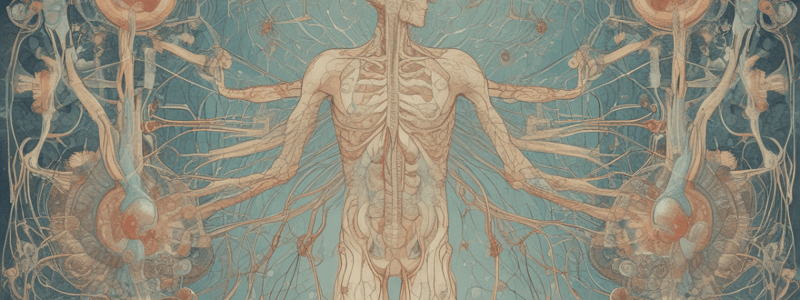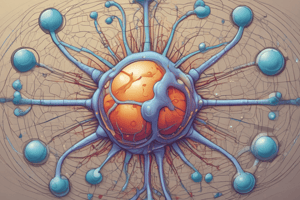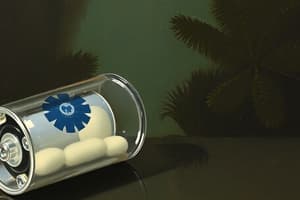Podcast
Questions and Answers
Muscarinic Agonists target the Parasympathetic Nervous System.
Muscarinic Agonists target the Parasympathetic Nervous System.
True
Halt Digestion, Mydriasis, Urinary retention, Bronchodilation, and Halt salivary secretions are associated with the Parasympathetic Nervous System.
Halt Digestion, Mydriasis, Urinary retention, Bronchodilation, and Halt salivary secretions are associated with the Parasympathetic Nervous System.
False
Which of the following is a Reversible Cholinesterase Inhibitor that does NOT cross the blood-brain barrier?
Which of the following is a Reversible Cholinesterase Inhibitor that does NOT cross the blood-brain barrier?
Which of the following is a Reversible Cholinesterase Inhibitor that does cross the blood-brain barrier?
Which of the following is a Reversible Cholinesterase Inhibitor that does cross the blood-brain barrier?
Signup and view all the answers
An overdose of cholinergic drugs is called "Cholinergic Crisis" or "Cholinergic Toxicity".
An overdose of cholinergic drugs is called "Cholinergic Crisis" or "Cholinergic Toxicity".
Signup and view all the answers
Which of the following ADR is associated with cholinergic agonists?
Which of the following ADR is associated with cholinergic agonists?
Signup and view all the answers
Which of the following is the Pharm. Action of Cholinesterase Inhibitors?
Which of the following is the Pharm. Action of Cholinesterase Inhibitors?
Signup and view all the answers
What is the CNS pathology of Alzheimer's Disease (AD)?
What is the CNS pathology of Alzheimer's Disease (AD)?
Signup and view all the answers
What is the main symptom of Alzheimer's Disease?
What is the main symptom of Alzheimer's Disease?
Signup and view all the answers
Which pharmacologic class is associated with Alzheimer's Disease?
Which pharmacologic class is associated with Alzheimer's Disease?
Signup and view all the answers
Irreversible, cholinesterase inhibitors that do not cross the BBB are used to treat AD.
Irreversible, cholinesterase inhibitors that do not cross the BBB are used to treat AD.
Signup and view all the answers
Rivastigmine is metabolized by cholinesterase.
Rivastigmine is metabolized by cholinesterase.
Signup and view all the answers
Transdermal patches are available for Donepezil and Rivastigmine
Transdermal patches are available for Donepezil and Rivastigmine
Signup and view all the answers
Donepezil and Galantamine are substrates of which two CYPs?
Donepezil and Galantamine are substrates of which two CYPs?
Signup and view all the answers
Irreversible cholinesterase inhibitors are used as pesticides and warfare agents?
Irreversible cholinesterase inhibitors are used as pesticides and warfare agents?
Signup and view all the answers
Which of the following drugs are NOT pesticides?
Which of the following drugs are NOT pesticides?
Signup and view all the answers
Which of the following drugs is NOT a warfare agent?
Which of the following drugs is NOT a warfare agent?
Signup and view all the answers
Which pharmacologic class is associated with Myasthenia Gravis (MG)?
Which pharmacologic class is associated with Myasthenia Gravis (MG)?
Signup and view all the answers
What is the Peripheral pathology of MG?
What is the Peripheral pathology of MG?
Signup and view all the answers
Muscle weakness and fatigue are symptoms of Myasthenia Gravis (MG).
Muscle weakness and fatigue are symptoms of Myasthenia Gravis (MG).
Signup and view all the answers
Reversible, competitive cholinesterase inhibitors that do NOT cross the BBB are used to treat MA, Cholinergic crisis from exposure to irreversible cholinesterase inhibitors and Neuromuscular blockade reversal
Reversible, competitive cholinesterase inhibitors that do NOT cross the BBB are used to treat MA, Cholinergic crisis from exposure to irreversible cholinesterase inhibitors and Neuromuscular blockade reversal
Signup and view all the answers
Which cholinesterase inhibitors used for Myasthenia Gravis treatment have a long duration?
Which cholinesterase inhibitors used for Myasthenia Gravis treatment have a long duration?
Signup and view all the answers
What is the most common cholinesterase inhibitor used for Alzheimer's Disease?
What is the most common cholinesterase inhibitor used for Alzheimer's Disease?
Signup and view all the answers
Edrophonium, used to treat Myasthenia Gravis, has a short duration (minutes)
Edrophonium, used to treat Myasthenia Gravis, has a short duration (minutes)
Signup and view all the answers
Antidote, used to treat toxic exposure to irreversible cholinesterase inhibitors (aka Cholinergic Criss or Toxicity). It is an Acetylcholinesterase Activator
Antidote, used to treat toxic exposure to irreversible cholinesterase inhibitors (aka Cholinergic Criss or Toxicity). It is an Acetylcholinesterase Activator
Signup and view all the answers
Parasympathetic Nervous System - Associated with Miosis, Promoting salivary secretions, Maintain steady heart rate, Promote digestion, Promote urination.
Parasympathetic Nervous System - Associated with Miosis, Promoting salivary secretions, Maintain steady heart rate, Promote digestion, Promote urination.
Signup and view all the answers
Cholinergic agonist binds both nicotinic and muscarinic receptors
Cholinergic agonist binds both nicotinic and muscarinic receptors
Signup and view all the answers
Which of the following drugs are Cholinergic Agonists?
Which of the following drugs are Cholinergic Agonists?
Signup and view all the answers
What is the Pharm. Action of Pilocarpine?
What is the Pharm. Action of Pilocarpine?
Signup and view all the answers
What is the MOA of Pilocarpine?
What is the MOA of Pilocarpine?
Signup and view all the answers
What is the clinical use of Pilocarpine?
What is the clinical use of Pilocarpine?
Signup and view all the answers
What is the therapeutic class of Pilocarpine?
What is the therapeutic class of Pilocarpine?
Signup and view all the answers
What is the indication for Methacholine, a Muscarinic Agonist?
What is the indication for Methacholine, a Muscarinic Agonist?
Signup and view all the answers
What is the Pharm. Action of Methacholine?
What is the Pharm. Action of Methacholine?
Signup and view all the answers
What is the indication of Bethanechol, a Muscarinic Agonist?
What is the indication of Bethanechol, a Muscarinic Agonist?
Signup and view all the answers
What is the Pharm. Action of Bethanechol?
What is the Pharm. Action of Bethanechol?
Signup and view all the answers
Match the Muscarinic Agonists with their Pharm. Actions.
Match the Muscarinic Agonists with their Pharm. Actions.
Signup and view all the answers
What is the MOA of Atropine?
What is the MOA of Atropine?
Signup and view all the answers
Which of the following is NOT an indication for Atropine?
Which of the following is NOT an indication for Atropine?
Signup and view all the answers
Atropine indications are usually critical conditions.
Atropine indications are usually critical conditions.
Signup and view all the answers
Atropine is used for Peripheral uses
Atropine is used for Peripheral uses
Signup and view all the answers
What is the MOA of Scopolamine?
What is the MOA of Scopolamine?
Signup and view all the answers
What is NOT an indication for Scopolamine?
What is NOT an indication for Scopolamine?
Signup and view all the answers
Scopolamine is indicated for usually NOT critical conditions.
Scopolamine is indicated for usually NOT critical conditions.
Signup and view all the answers
Scopolamine is for Central uses.
Scopolamine is for Central uses.
Signup and view all the answers
Which of the following is NOT indicated for both Atropine and Scopolamine?
Which of the following is NOT indicated for both Atropine and Scopolamine?
Signup and view all the answers
ADRs associated with Atropine and Scopolamine are SLUDGE-DDUMBELS?
ADRs associated with Atropine and Scopolamine are SLUDGE-DDUMBELS?
Signup and view all the answers
Which drug does NOT have the "Mydriatic, Cycloplegic" therapeutic class?
Which drug does NOT have the "Mydriatic, Cycloplegic" therapeutic class?
Signup and view all the answers
What is the clinical use of the Mydriatic, Cycloplegic class?
What is the clinical use of the Mydriatic, Cycloplegic class?
Signup and view all the answers
What is the Pharm. Action of the Mydriatic, Cycloplegic class?
What is the Pharm. Action of the Mydriatic, Cycloplegic class?
Signup and view all the answers
The ADR for the Mydriatic, Cycloplegic class is: Minimized due to local application
The ADR for the Mydriatic, Cycloplegic class is: Minimized due to local application
Signup and view all the answers
Which of the following is NOT an non-selective Muscarinic Antagonist for OAB?
Which of the following is NOT an non-selective Muscarinic Antagonist for OAB?
Signup and view all the answers
Which of the following is a M3-selective Muscarinic Antagonist for OAB?
Which of the following is a M3-selective Muscarinic Antagonist for OAB?
Signup and view all the answers
Which kind of drugs treat an overactive bladder (OAB)?
Which kind of drugs treat an overactive bladder (OAB)?
Signup and view all the answers
What is the MOA of Genitourinary/Urinary Antispasmodic drugs?
What is the MOA of Genitourinary/Urinary Antispasmodic drugs?
Signup and view all the answers
What is the Non-selective OAB drug that can cross the BBB?
What is the Non-selective OAB drug that can cross the BBB?
Signup and view all the answers
Darifenacin is a CYP2D6 substrate.
Darifenacin is a CYP2D6 substrate.
Signup and view all the answers
Trospium is a CYP3A4 substrate.
Trospium is a CYP3A4 substrate.
Signup and view all the answers
Trospium has lipophilicity.
Trospium has lipophilicity.
Signup and view all the answers
What is the Pharm. Action of Urinary Antispasmodics?
What is the Pharm. Action of Urinary Antispasmodics?
Signup and view all the answers
What is the MOA of Bronchodilators?
What is the MOA of Bronchodilators?
Signup and view all the answers
What is the short-acting (6-8 hours) Bronchodilator?
What is the short-acting (6-8 hours) Bronchodilator?
Signup and view all the answers
Which of the following is NOT a long-acting (>12 hours) Bronchodilator?
Which of the following is NOT a long-acting (>12 hours) Bronchodilator?
Signup and view all the answers
What is the Pharm. Action for Bronchodilators?
What is the Pharm. Action for Bronchodilators?
Signup and view all the answers
ADR for Bronchodilators: Xerostomia but minimized due to local application - Anticholinergic Syndrome-like symptoms for systemic circulation.
ADR for Bronchodilators: Xerostomia but minimized due to local application - Anticholinergic Syndrome-like symptoms for systemic circulation.
Signup and view all the answers
What is the indication for Bronchodilators?
What is the indication for Bronchodilators?
Signup and view all the answers
Long-acting muscarinic agonists (LAMA) - Prophylactic use for daily maintenance
Long-acting muscarinic agonists (LAMA) - Prophylactic use for daily maintenance
Signup and view all the answers
Which of the following Bronchodilators do NOT have Dry Powder formulations?
Which of the following Bronchodilators do NOT have Dry Powder formulations?
Signup and view all the answers
For the Dry Powder Bronchodilators, avoid use if you have a milk allergy
For the Dry Powder Bronchodilators, avoid use if you have a milk allergy
Signup and view all the answers
What is the Pharmacologic Class for Nicotine?
What is the Pharmacologic Class for Nicotine?
Signup and view all the answers
What is the indication for Nicotine?
What is the indication for Nicotine?
Signup and view all the answers
Tobacco is the unnatural source of nicotine
Tobacco is the unnatural source of nicotine
Signup and view all the answers
What is the Pharm. Action of Nicotine?
What is the Pharm. Action of Nicotine?
Signup and view all the answers
Match the ADRs of Nicotine
Match the ADRs of Nicotine
Signup and view all the answers
Match the Positive/Negative effects of nicotine
Match the Positive/Negative effects of nicotine
Signup and view all the answers
What drug is apart of the Partial Nicotinic Agonist class?
What drug is apart of the Partial Nicotinic Agonist class?
Signup and view all the answers
What is the indication for Varenicline?
What is the indication for Varenicline?
Signup and view all the answers
What is the Pharm. Action of Varenicline?
What is the Pharm. Action of Varenicline?
Signup and view all the answers
Which of the following is NOT an ADR to Varenicline?
Which of the following is NOT an ADR to Varenicline?
Signup and view all the answers
What Pharmacologic class is Mecamlyamine?
What Pharmacologic class is Mecamlyamine?
Signup and view all the answers
Mecamylamine is in the antihypertensive class, therefore making it indicated for malignant hypertension.
Mecamylamine is in the antihypertensive class, therefore making it indicated for malignant hypertension.
Signup and view all the answers
What is the MOA of Mecamylamine?
What is the MOA of Mecamylamine?
Signup and view all the answers
Mecamylamine significantly decreases blood pressure
Mecamylamine significantly decreases blood pressure
Signup and view all the answers
ALL anticholinergics are identified to be inappropriate for any individual with dementia, cognitive impairment, delirium, lower urinary tract symptoms, and benign prostatic hypertrophy
ALL anticholinergics are identified to be inappropriate for any individual with dementia, cognitive impairment, delirium, lower urinary tract symptoms, and benign prostatic hypertrophy
Signup and view all the answers
Anticholinergic drugs are known as "Antimuscarinics" and "Muscarinic Antagonists"
Anticholinergic drugs are known as "Antimuscarinics" and "Muscarinic Antagonists"
Signup and view all the answers
What identifies drugs with increased incidence of anticholinergic syndrome-like adverse drug reactions?
What identifies drugs with increased incidence of anticholinergic syndrome-like adverse drug reactions?
Signup and view all the answers
You should avoid taking more than 2 anticholinergic drugs
You should avoid taking more than 2 anticholinergic drugs
Signup and view all the answers
Match the Generic/Brand names
Match the Generic/Brand names
Signup and view all the answers
Match the Generic/Brand names.
Match the Generic/Brand names.
Signup and view all the answers
Match the Generic/Brand names.
Match the Generic/Brand names.
Signup and view all the answers
Match the Generic/Brand names.
Match the Generic/Brand names.
Signup and view all the answers
Match the Generic/Brand names.
Match the Generic/Brand names.
Signup and view all the answers
Match the Generic/Brand names.
Match the Generic/Brand names.
Signup and view all the answers
Study Notes
Parasympathetic Nervous System
- Targets of Muscarinic Agonists
- Associated with:
- Halt Digestion
- Mydriasis
- Urinary retention
- Bronchodilation
- Halt salivary secretions
- Miosis
- Promoting salivary secretions
- Maintaining steady heart rate
- Promoting digestion
- Promoting urination
Cholinergic Crisis
- An overdose of cholinergic drugs is also known as "Cholinergic Toxicity"
- Associated with cholinergic agonists
Alzheimer's Disease (AD)
- CNS pathology:
- Main symptom:
- Associated pharmacologic class:
- Irreversible, cholinesterase inhibitors that do not cross the BBB are used to treat AD
- Rivastigmine is metabolized by cholinesterase
- Transdermal patches are available for Donepezil and Rivastigmine
- Donepezil and Galantamine are substrates of CYP2D6 and CYP3A4
Myasthenia Gravis (MG)
- Associated pharmacologic class:
- Peripheral pathology:
- Symptoms: muscle weakness and fatigue
- Reversible, competitive cholinesterase inhibitors that do NOT cross the BBB are used to treat MG
- Cholinergic crisis from exposure to irreversible cholinesterase inhibitors and Neuromuscular blockade reversal
- Edrophonium, used to treat MG, has a short duration (minutes)
Cholinesterase Inhibitors
- Pharm.Action:
- Irreversible cholinesterase inhibitors are used as pesticides and warfare agents
- Antidote, used to treat toxic exposure to irreversible cholinesterase inhibitors (aka Cholinergic Crisis or Toxicity), is an Acetylcholinesterase Activator
Muscarinic Agonists
- Bind both nicotinic and muscarinic receptors
- Examples:
- Pharm.Action of Pilocarpine:
- MOA of Pilocarpine:
- Clinical use of Pilocarpine:
- Therapeutic class of Pilocarpine:
- Indication for Methacholine:
- Pharm.Action of Methacholine:
- Indication of Bethanechol:
- Pharm.Action of Bethanechol:
Anticholinergics
- MOA of Atropine:
- Indications:
- Peripheral uses
- MOA of Scopolamine:
- Indications:
- Central uses
- ADRs associated with Atropine and Scopolamine: SLUDGE-DDUMBELS
Urinary Antispasmodics
- MOA:
- Pharm.Action:
- Treat an overactive bladder (OAB)
- Non-selective Muscarinic Antagonist for OAB:
- M3-selective Muscarinic Antagonist for OAB: Darifenacin
- Darifenacin is a CYP2D6 substrate
- Trospium is a CYP3A4 substrate
- Trospium has lipophilicity
Bronchodilators
- MOA:
- Pharm.Action:
- Short-acting (6-8 hours):
- Long-acting (>12 hours):
- ADR: Xerostomia but minimized due to local application - Anticholinergic Syndrome-like symptoms for systemic circulation
- Indication:
Nicotine
- Pharm.Action:
- Indication:
- Tobacco is the unnatural source of nicotine
- Match the ADRs of Nicotine
- Match the Positive/Negative effects of nicotine
- Varenicline is a Partial Nicotinic Agonist
- Indication for Varenicline:
- Pharm.Action of Varenicline:
- ADR to Varenicline:
Miscellaneous
- Mecamylamine is in the antihypertensive class, therefore making it indicated for malignant hypertension
- MOA of Mecamylamine:
- Mecamylamine significantly decreases blood pressure
- ALL anticholinergics are identified to be inappropriate for any individual with dementia, cognitive impairment, delirium, lower urinary tract symptoms, and benign prostatic hypertrophy
- Anticholinergic drugs are known as "Antimuscarinics" and "Muscarinic Antagonists"
- Identify drugs with increased incidence of anticholinergic syndrome-like adverse drug reactions:
- Avoid taking more than 2 anticholinergic drugs
Studying That Suits You
Use AI to generate personalized quizzes and flashcards to suit your learning preferences.
Description
Explore how Muscarinic Agonists affect the Parasympathetic Nervous System with this quiz. Test your knowledge on the interactions between drugs and the parasympathetic branch of the autonomic nervous system.




